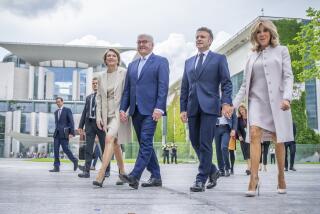Mitterrand Denies Fearing Reunification of Germany
- Share via
BONN — French President Francois Mitterrand declared Friday that he has no fears about a reunited Germany.
Mitterrand, in Bonn for talks with West German Chancellor Helmut Kohl on the rapidly moving political events in East Europe, told reporters:
“I am not afraid of reunification. I think the desire for reunification is legitimate for the Germans. What counts above all is the determination and will of the people. No one can challenge that will.”
The French government has generally been considered the most apprehensive of all the Western allies about the possibility of East and West Germany reuniting. But Mitterrand, with Kohl at his side, said in answer to a reporter’s question:
“I would be astonished if, within the next decade, we were not confronted with a new European structure. It will come quickly, very quickly, though perhaps not as quickly as those wanting reunification would wish.”
He added that “no European politician should ignore this issue any longer.”
He is looking forward, he said, to an early visit to East Germany to meet the new leader, Egon Krenz, and to talk with opposition groups.
Kohl said his government’s interest in East Germany does not indicate any lessening of its commitment to the European Community.
“It is clear for us,” he said, “that developments in Germany, and in the other part of Germany, make it urgently necessary that we push the process of European unity further forward.
“German problems can only be solved under a European roof. We are not wanderers between the worlds. Our place is in the Western community of values.”
East Germany has been racked by weeks of demonstrations demanding democracy. In addition, thousands of its citizens have been fleeing to West Germany, creating a delicate diplomatic situation.
Kohl and Mitterrand also discussed proposals put forth within the European Community that have been opposed by Prime Minister Margaret Thatcher of Britain. They agreed that a proposed social charter emphasizing workers’ rights should be approved at the December meeting of European Community heads of government.
Conservative Thatcher has dismissed the proposal as socialist.
“I am the first to want a good agreement with the British,” Mitterrand said, “but if they do not want it as much as I do, what can I do?”
Asked whether Britain’s reluctance to accept a social charter could lead to a two-track approach by the community, with different regulations for different members, Mitterrand replied, with a tight smile:
“I hope not. I do not want it. But those countries who want to be at the back of the train cannot be allowed to put the brakes on those in the locomotive.”
France and West Germany, he indicated, are in the locomotive.
Kohl said, “We are both of the opinion that it would be unthinkable to build a Europe without the workers and also without their organizations.”
More to Read
Sign up for Essential California
The most important California stories and recommendations in your inbox every morning.
You may occasionally receive promotional content from the Los Angeles Times.











